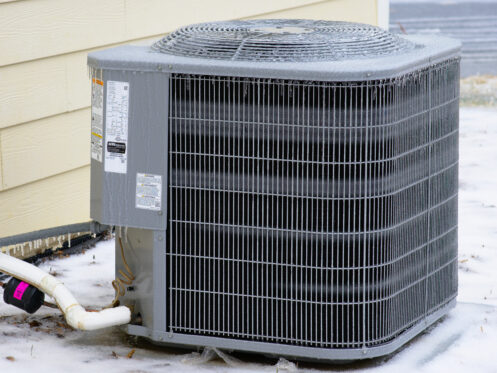When your outside AC unit is frozen, it can quickly disrupt the comfort of your home. This common issue can lead to inefficient cooling and increased energy bills. Knowing why this happens and how to fix it can help you keep your home comfortable. In this article, we will explore the causes of a frozen AC unit, signs to watch for, solutions to fix the problem, and tips to prevent it from happening in the future.
Why Does an Outside AC Unit Freeze?
To understand why an outside AC unit might freeze, it’s helpful to know how air conditioners work. An AC unit cools your home by taking heat from inside and letting it out. This process involves moving coolant through coils, which absorb and expel heat. For a detailed explanation, you can refer to How Do Air Conditioners Work? | Air Conditioning System | AC.
Several common issues can cause an AC unit outside to freeze up:
- Low Coolant Levels: When there’s not enough coolant, the pressure in the system drops, causing the coils to become too cold and freeze.
- Airflow Problems: Blocked or restricted airflow over the coils can lead to freezing. This can be caused by dirty air filters, blocked vents, or issues with the blower fan. For more information on fixing airflow issues, visit AC Not Blowing Cold Air – How to Fix.
- Temperature Settings: Setting the thermostat too low can cause the unit to freeze, especially if it’s not designed to operate at such low temperatures.
Understanding these causes is the first step towards preventing and addressing the problem of a frozen AC unit.
Signs Your AC Unit Outside is Freezing Up
Knowing the signs of a frozen AC unit can help you avoid expensive repairs and discomfort. Here are some typical indicators that your AC unit might be freezing up:
- Ice Buildup: One of the most obvious signs is visible ice on the outdoor unit or pipes. This can occur even during warm weather.
- Reduced Airflow: If you notice that the airflow from your vents is weaker than usual, it could be due to a frozen AC unit restricting the system’s efficiency.
- Unusual Noises: Strange noises, such as hissing or bubbling, might indicate issues with refrigerant flow, often related to freezing problems.
Early detection of these signs is crucial to prevent further damage to your air conditioning system. Addressing the issue promptly can help maintain your home’s comfort and avoid more extensive repairs.
How to Fix a Frozen Pipe on AC Unit Outside
If you find a frozen pipe on your outside AC unit, here are steps to fix it. Follow these simple instructions to help resolve the problem:
- Turn Off the AC: First, switch off your air conditioning unit to prevent further freezing and allow the ice to melt naturally.
- Check for Airflow Obstructions: Inspect the outdoor unit and surrounding area for any debris or blockages that might be hindering airflow. Clear away leaves, dirt, or other obstructions.
- Inspect the Air Filter: A clogged air filter can restrict airflow, contributing to freezing. Make sure to clean or replace the filter if necessary.
- Check Thermostat Settings: Ensure that your thermostat is set to a reasonable temperature. Extremely low settings can cause the system to overwork and freeze.
- Allow Time for Thawing: Give the system time to thaw completely before attempting to turn it back on. This might take several hours depending on the extent of the freezing.
Preventing Your AC Pipes from Freezing
It’s important to keep your AC unit running well to avoid the trouble of frozen pipes. Here are some practical tips to help prevent your AC pipes from freezing:
- Regular Maintenance: Schedule regular check-ups for your AC system to ensure it’s in top condition. This includes cleaning or replacing filters, checking refrigerant levels, and inspecting the unit for any signs of wear and tear. For more tips, visit Prevent AC Frozen Coils at Home.
- Proper Thermostat Settings: Avoid setting your thermostat too low, especially during cooler weather. This helps prevent the coils from freezing over.
- Ensure Adequate Airflow: Keep vents open and unblocked to maintain proper airflow throughout your home, reducing the risk of freezing.
- Check for Obstructions: Regularly inspect the outdoor unit for any debris or obstructions that might impede airflow.
For more maintenance tips, explore the advice from ENERGY STAR on keeping your HVAC system efficient.
Energy Efficiency Tips to Avoid Freezing
Making your home more energy-efficient saves money and helps stop your AC unit from freezing. Here are some strategies to enhance energy efficiency:
- Insulate Your Home: Proper insulation helps maintain a consistent indoor temperature, reducing the workload on your AC unit.
- Seal Leaks: Check for and seal any leaks around windows and doors to prevent warm air from entering and cold air from escaping.
- Use a Programmable Thermostat: Set your thermostat to adjust temperatures based on your schedule to avoid unnecessary cooling.
- Upgrade to Energy-Efficient Equipment: Consider investing in an energy-efficient AC unit that can help reduce the risk of freezing and lower energy bills.
For more energy-saving tips, visit the Department of Energy website.
When to Call a Professional
While you can fix some freezing issues yourself, sometimes you need professional help. Knowing when to call in the experts can save you from further damage and ensure your system runs efficiently. Here are some situations where professional intervention is necessary:
- Persistent Freezing: If your AC unit outside keeps freezing up despite your efforts to fix it, it’s time to call a professional. There could be underlying issues that require expert diagnosis. For expert help, consider Air Conditioner Repair services.
- Complex Repairs: If the problem involves complex parts of your AC system, such as the compressor or internal components, professional expertise is crucial to avoid causing further damage.
- Refrigerant Issues: Handling refrigerants requires specialized knowledge and tools. If you suspect low refrigerant levels, it’s best to leave it to the professionals.
For homeowners in the Greater Austin area and Abilene, Quality Cooling and Heating offers reliable HVAC services. Their team is ready to assist with any AC or plumbing issues, ensuring your home remains comfortable year-round.
Ensuring Year-Round Comfort
Maintaining a comfortable home environment requires regular care and attention to your HVAC system. Here are the key takeaways to ensure your AC unit runs smoothly and efficiently:
- Regular Maintenance: Schedule routine check-ups to catch potential issues early and keep your system in top shape.
- Timely Repairs: Address problems as soon as they arise to prevent them from escalating into more significant issues.
- Energy Efficiency: Implement energy-saving practices to reduce the likelihood of your AC pipes freezing and to lower your energy bills. For more tips, refer to the Department of Energy’s guide on central air conditioning.
For comprehensive HVAC and plumbing services, consider reaching out to Quality Cooling and Heating. Their professional, community-focused approach ensures that homeowners in their service areas receive high-quality care and support for all their heating and cooling needs.


